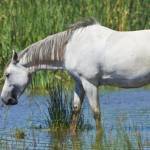Pythiosis Skin Infections in Horses

Pythiosis—also known by the appealing monikers of swamp cancer, leeches, or kunkers—is caused by Pythium insidiosum, a one-celled organism that is similar to fungi but classified into the kingdom Protista. Pythiosis in horses usually occurs as a serious skin infection. The skin develops raised, ulcerated lesions that ooze serum. Most affected horses are extremely itchy at the site of infection and may self-traumatize by vigorously scratching or biting at the lesions. Pythiosis may also involve the horse’s bone or intestine. Important rule-outs for pythiosis include proud flesh (exuberant growth of granulation tissue), summer sores (habronemiasis), fungal infections, or cancer.
In nature, Pythium organisms live in water and parasitize plants. Animals are believed to become infected when they enter P. insidiosum-infested water with incised or damaged skin. Pythiosis most commonly occurs in warmer areas of the world, including the Gulf Coast of the United States. However, it is increasingly diagnosed outside of its expected range.
The diagnosis of pythiosis is not always straightforward because the organisms can be difficult to detect and identify. Pythium organisms can sometimes be seen when biopsies are examined with special stains using a microscope or cultured from biopsy tissue. There are also specialized tests to detect antibodies against P. insidiosum or its DNA.
Treatment of pythiosis can be very difficult and severe lesions have a guarded prognosis. Lesions can be large and often must be surgically debulked before specific treatment begins. Immunotherapy (vaccination) improves recovery, especially in cases that are diagnosed early. Antifungal drugs, such as potassium iodide and amphotericin B, can be effective in some cases.
Pythiosis is an uncommon diagnosis and the best outcome depends on early recognition of infection. Pythiosis should be ruled out as the cause of proliferative skin lesions in geographic areas where it often occurs, especially in cases that do not respond to conventional therapy for more common conditions.








